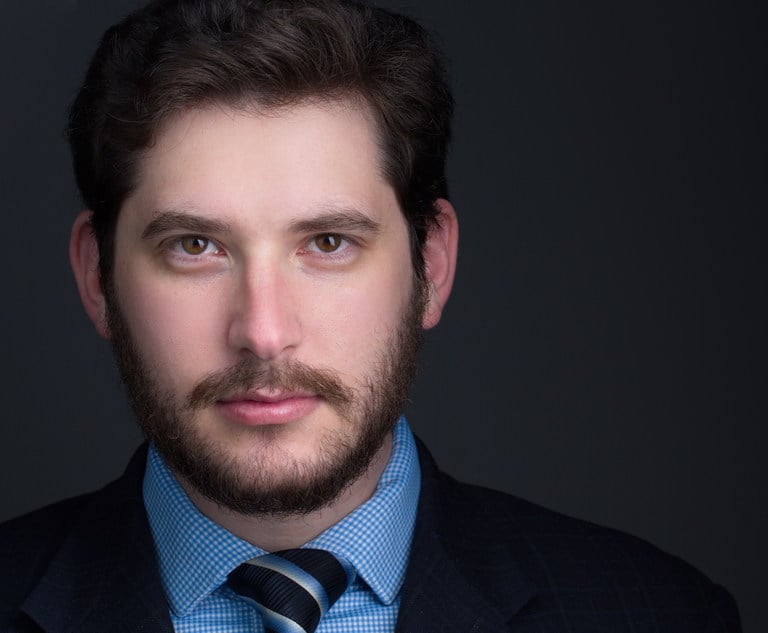Disbarred Ex-Law Firm Chairman Scott Rothstein Stuck With 50-Year Sentence
A judge says federal prosecutors have the discretion to yank an offer of a reduced prison sentence.
April 18, 2018 at 03:57 PM
3 minute read

An on-and-off-again government motion is dead on trimming the 50-year prison sentence of disbarred ex-law firm chairman Scott Rothstein for engineering a $1.2 billion Ponzi scheme.
U.S. District Judge James Cohn ruled Monday that federal prosecutors “clearly may withdraw” their motion for a reduced sentence tied to Rothstein's commitment to fully cooperate.
Prosecutors didn't offer details for why they scrapped the offer initially made in 2011, and Rothstein argued they lacked that power. Without a hearing, the Fort Lauderdale judge ruled in the government's favor on a question of law.
Rothstein, 55, was leading the 70-attorney Rothstein Rosenfeldt Adler when he pitched investments in fake legal settlements and forged court documents, scamming hundreds of people including auto magnate Ed Morse.
Rothstein later testified his entourage was “living like rock stars.” He plowed investor funds into an opulent office, an extensive watch collection, a Bugatti, a waterfront Fort Lauderdale mansion, a New York condo and other luxuries. A condo unit near the firm's Fort Lauderdale office was used for sex and drug parties.
He hopped a Gulfstream jet to Morocco for eight days when the fraud collapsed in 2009, then returned to face justice. One of the first things he did in custody was inform on mob figures who weren't tied to Florida's biggest fraud.
Under a deal, Rothstein pleaded guilty to three conspiracy and two wire fraud counts. A handful of other attorneys were convicted in the fallout, which extended to illegal campaign contributions.
A year after Rothstein's sentencing, prosecutors filed the motion for a reduced sentence while asking for a stay on the decision “because Rothstein's cooperation was still ongoing,” Cohn wrote. Prosecutors pulled the plug on it last September.
Rothstein has been held by the U.S. Bureau of Prisons in secrecy, making his latest public appearance six years ago for depositions in his defunct law firm's bankruptcy case. His attorney described the 50-year sentence as “tantamount to life in prison.”
Rothstein wrote Cohn in March to say the “special security conditions of my confinement” made it difficult for him to communicate with his attorney, Marc Nurik, to prepare his legal response to the withdrawn motion. Rothstein typed his own response “using an extremely old typewriter.”
“Why would any criminal defendant enter into a plea agreement which could be interpreted as promising him nothing?” Rothstein asked Cohn.
The judge's order said Nurik agreed that prosecutors reserved the right to withdraw their motion, and “Rothstein was on notice of the potential consequences of his untruthfulness.”
Rothstein could have been in trouble for things close to home. His wife, Kim, pleaded guilty in 2013 to hiding more than $1 million worth of gems that had been withheld from federal agents, who collected all the fraud proceeds they could find.
Nurik, who has offices in Boca Raton and Los Angeles, said Wednesday that he hasn't had a chance to discuss the ruling with Rothstein and had no comment on the decision.
“Federal inmates typically have a lot of phone access, and they also have the ability to use email. There's no email system in his situation, and phone access is limited,” Nurik said. “I can't communicate with him within the normal channels.”
This content has been archived. It is available through our partners, LexisNexis® and Bloomberg Law.
To view this content, please continue to their sites.
Not a Lexis Subscriber?
Subscribe Now
Not a Bloomberg Law Subscriber?
Subscribe Now
NOT FOR REPRINT
© 2025 ALM Global, LLC, All Rights Reserved. Request academic re-use from www.copyright.com. All other uses, submit a request to [email protected]. For more information visit Asset & Logo Licensing.
You Might Like
View All
Tragedy on I-95: Florida Lawsuit Against Horizon Freight System Could Set New Precedent in Crash Cases
2 minute read
'You Lied to the Jury': Veteran Awarded $5 Million in Defamation Case Against CNN
4 minute read
Vedder Price Shareholder Javier Lopez Appointed to Miami Planning, Zoning & Appeals Board
2 minute readTrending Stories
- 1Settlement Allows Spouses of U.S. Citizens to Reopen Removal Proceedings
- 2CFPB Resolves Flurry of Enforcement Actions in Biden's Final Week
- 3Judge Orders SoCal Edison to Preserve Evidence Relating to Los Angeles Wildfires
- 4Legal Community Luminaries Honored at New York State Bar Association’s Annual Meeting
- 5The Week in Data Jan. 21: A Look at Legal Industry Trends by the Numbers
Who Got The Work
J. Brugh Lower of Gibbons has entered an appearance for industrial equipment supplier Devco Corporation in a pending trademark infringement lawsuit. The suit, accusing the defendant of selling knock-off Graco products, was filed Dec. 18 in New Jersey District Court by Rivkin Radler on behalf of Graco Inc. and Graco Minnesota. The case, assigned to U.S. District Judge Zahid N. Quraishi, is 3:24-cv-11294, Graco Inc. et al v. Devco Corporation.
Who Got The Work
Rebecca Maller-Stein and Kent A. Yalowitz of Arnold & Porter Kaye Scholer have entered their appearances for Hanaco Venture Capital and its executives, Lior Prosor and David Frankel, in a pending securities lawsuit. The action, filed on Dec. 24 in New York Southern District Court by Zell, Aron & Co. on behalf of Goldeneye Advisors, accuses the defendants of negligently and fraudulently managing the plaintiff's $1 million investment. The case, assigned to U.S. District Judge Vernon S. Broderick, is 1:24-cv-09918, Goldeneye Advisors, LLC v. Hanaco Venture Capital, Ltd. et al.
Who Got The Work
Attorneys from A&O Shearman has stepped in as defense counsel for Toronto-Dominion Bank and other defendants in a pending securities class action. The suit, filed Dec. 11 in New York Southern District Court by Bleichmar Fonti & Auld, accuses the defendants of concealing the bank's 'pervasive' deficiencies in regards to its compliance with the Bank Secrecy Act and the quality of its anti-money laundering controls. The case, assigned to U.S. District Judge Arun Subramanian, is 1:24-cv-09445, Gonzalez v. The Toronto-Dominion Bank et al.
Who Got The Work
Crown Castle International, a Pennsylvania company providing shared communications infrastructure, has turned to Luke D. Wolf of Gordon Rees Scully Mansukhani to fend off a pending breach-of-contract lawsuit. The court action, filed Nov. 25 in Michigan Eastern District Court by Hooper Hathaway PC on behalf of The Town Residences LLC, accuses Crown Castle of failing to transfer approximately $30,000 in utility payments from T-Mobile in breach of a roof-top lease and assignment agreement. The case, assigned to U.S. District Judge Susan K. Declercq, is 2:24-cv-13131, The Town Residences LLC v. T-Mobile US, Inc. et al.
Who Got The Work
Wilfred P. Coronato and Daniel M. Schwartz of McCarter & English have stepped in as defense counsel to Electrolux Home Products Inc. in a pending product liability lawsuit. The court action, filed Nov. 26 in New York Eastern District Court by Poulos Lopiccolo PC and Nagel Rice LLP on behalf of David Stern, alleges that the defendant's refrigerators’ drawers and shelving repeatedly break and fall apart within months after purchase. The case, assigned to U.S. District Judge Joan M. Azrack, is 2:24-cv-08204, Stern v. Electrolux Home Products, Inc.
Featured Firms
Law Offices of Gary Martin Hays & Associates, P.C.
(470) 294-1674
Law Offices of Mark E. Salomone
(857) 444-6468
Smith & Hassler
(713) 739-1250







